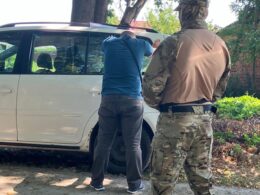Two Colombian veterans, José Aron Medina and Alexander Ante, were detained in Caracas, Venezuela, the Telegraph reports. The two veterans were considered missing at home until, half a year later, they appeared in a video from the Russian prison.
Their case marks the first time Ukrainian combatants have been detained in a third country unrelated to the war and handed over to Russia.
The disappearance
Alexander, 46, and José Aron, 37, were finally coming home after months of fighting in the Ukrainian army against Russia's invading forces. They began their journey through a series of flights: from Poland to Madrid, then to Caracas, with planned connections to Bogotá and finally Cali.
However, they never made it past Caracas.
For 43 agonizing days, their families searched desperately for answers. The breakthrough came in the form of a propaganda piece: on 30 August 2024, Russia Today broadcast a staged "interview" showing both men in custody in Moscow. The footage showed them handcuffed, flanked by masked guards, expressing staged regret for their service in Ukraine. It was the first and last proof of life their families would receive.
Both men had served in the Colombian army before joining Ukraine's fight against Russian invasion. Drawing on their experience fighting guerrillas in Colombia, they enlisted with the 49th Infantry Battalion Karpatska Sich. They served honorably, regularly calling home and supporting families through their military salary of $2,400 to $3,200 monthly.
International implications
This case represents more than just two missing soldiers -- it highlights a disturbing new phase in
Russia's global reach. The circumstances strongly suggest a coordinated operation between Venezuela's Nicolás Maduro regime and Moscow, with the two men likely being seized at Caracas Airport and extradited to Russia without any legal process. The timing is particularly telling, occurring just days after Venezuela's controversial election, suggesting the men may have been offered as a gift to secure Russian support for Maduro's regime.
Diplomatic silence and legal limbo
The response from official channels has been remarkably muted. Héctor Arenas Neira, Colombia's ambassador to Russia, has taken a notably passive stance, refusing to investigate how the men arrived in Moscow or challenge potential violations of international law. The men face potential 12-18 year prison sentences for "being mercenaries," despite the Geneva Convention's provisions regarding international military volunteers.
Their legal representation comes from a court-appointed Russian lawyer who doesn't
speak Spanish, assigned by the very state that orchestrated their capture. Their families have been unable to establish any contact or receive updates about their condition.
Columbian President Gustavo Petro's administration has maintained a conspicuous silence, despite making humanitarian appeals in other cases, including that of former FARC commander Simón Trinidad, imprisoned in the United States. This selective advocacy has not gone unnoticed by the families.
Congressman José Jaime Uscátegui's team has taken up the case, filing a forced disappearance complaint with the International Criminal Court in December. However, the challenge of building sufficient political pressure for their release remains daunting.
The human cost
The human cost of this international crisis is perhaps best illustrated through Otilia Ante's ongoing ordeal. "I'm tired of living. I don't know what else to do, always thinking about my son," she told reporters, expressing her greatest fear: dying before seeing her son again. Every night, she lights candles and prays to the saints for his return.
José Aron's wife, Cielo Paz, was expecting her husband to arrive for the weekend to celebrate his 37th birthday. But José Aron never arrived, and none of his wife's loving text messages ever reached him.
Broader intensification of Moscow's special operations
The unprecedented nature of detaining Ukrainian fighters in a third country marks a significant escalation in Russia's tactics. Borrowed from the KGB playbook, the case demonstrates Moscow's efforts to show that even after leaving the battlefield, those who opposed Moscow may never truly be beyond its grasp.
The case reflects a broader intensification of operations by Moscow's special services, including arson attacks and explosions targeting military recruitment offices and soldiers' vehicles in Ukraine, as well as a series of car vandalism incidents in Germany allegedly staged to frame Merz's supporters and influence upcoming elections.
Related:
- Bloomberg: Putin’s strength in Ukraine may be an illusion as Russia’s corporate debt hits $ 446 billion
- Politico: Europe moves to squeeze Russia’s shadow fleet as Finland shows how it’s done
- Trump’s Ukraine peace ambitions shatters against Putin’s total victory obsession
- Military bases now key focus as Ukraine’s deep-strike drone strike strategy shifts



